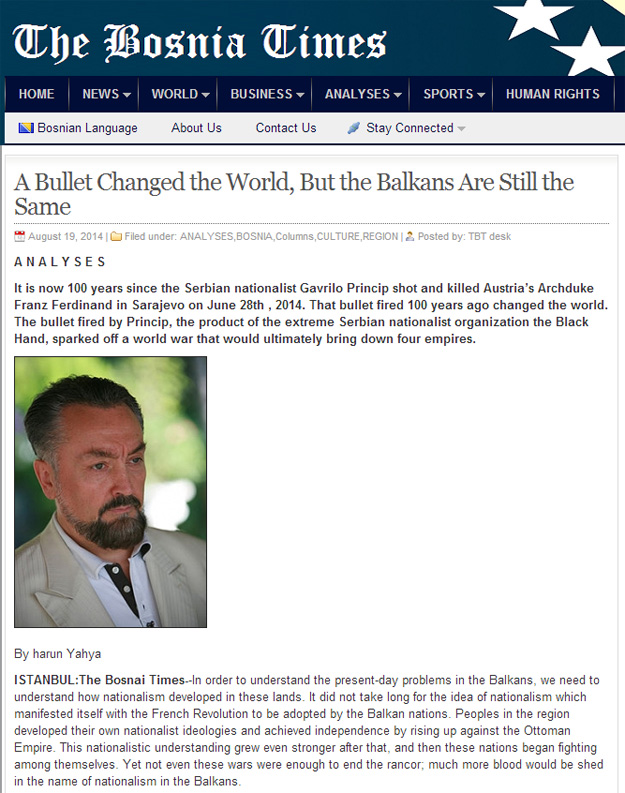
In order to understand the present-day problems in the Balkans, we need to understand how nationalism developed in these lands. It did not take long for the idea of nationalism which manifested itself with the French Revolution to be adopted by the Balkan nations. Peoples in the region developed their own nationalist ideologies and achieved independence by rising up against the Ottoman Empire. This nationalistic understanding grew even stronger after that, and then these nations began fighting among themselves. Yet not even these wars were enough to end the rancor; much more blood would be shed in the name of nationalism in the Balkans.
It is now 100 years since the Serbian nationalist Gavrilo Princip shot and killed Austria’s Archduke Franz Ferdinand in Sarajevo on June 28th , 2014. That bullet fired 100 years ago changed the world. The bullet fired by Princip, the product of the extreme Serbian nationalist organization the Black Hand, sparked off a world war that would ultimately bring down four empires.
When the war ended, great empires had been ruined as German and Italian inspired nationalism – the embodiment of the fiercest form of nationalism – took hold of the Balkans. By the 1930s, fascism represented the basis of society in the Balkans. Boris in Bulgaria, Carol in Romania, Zogu in Albania and Metexas in Greece were influenced by the German and Italian models and established their own fascist regimes. This time, war was not triggered in the Balkans, but another global power that had manifested itself in the Balkans; the Soviet Union and the ideology it represented – communism.
After the war, Turkey and Greece became members of NATO and Bulgaria and Romania members of the Warsaw Pact. Yugoslavia became the leader of the Independent Movement, which emerged as an alternative to the Soviets and the West. After a time of proximity to the Soviet Union, Albania eventually sided with China and under Enver Hoxha, began following a Maoist, isolationist policy.
This polarization put a temporary end to the bloody fighting between Balkan countries. With the collapse of the eastern bloc, old rivalries began reappearing and a fresh wave of violence began raging, especially in Bosnia.
Once again motivated by extreme nationalism, the Serbs wanted to seize Bosnia from the Muslim Bosniaks they referred to as ‘Turks.’ They embarked on a policy of genocide, such as the slaughter in Srebrenica. The wave of nationalism that had emerged at the end of the 19th Century started raging through the Balkans again as Yugoslavia disintegrated. The urge to resolve problems in the Balkans through force of arms lasted from 1992 to the early 2000s.
Although there is no fighting now, the nationalistic dynamics are as sound and influential as ever. The new Chetniks and Ustaše continue to sharpen their knives. The Golden Dawn Party in Greece, the Ataka Party in Bulgaria, the Radical Party in Serbia and the Croatian Party of Rights in Croatia are all ready to incite new tensions, or even conflict.
The fascist movements that turned the Balkans into a sea of blood are not independent of Europe; racist and xenophobic attitudes against migrants, and particularly against Muslims, have become increasingly powerful over the last 15 to 20 years in countries such as Germany, Denmark, Holland, France, Italy, Belgium, the United Kingdom and Austria. Parties with openly fascist tendencies enjoy constant increases in their vote shares. Racist groups enjoying open or secret support certainly play an important role in this.
Racist speech attracts great support in European countries, rocked by the economic crisis, during election times. Extreme right -wing parties emerged victorious in the elections to the European Parliament in 2014. The results of these elections were important in demonstrating the ongoing rise in racism and ethnocentrism in Europe.
It is impossible to explain the fascist propaganda easily produced in many parts of Europe in terms of ‘freedom of expression.’ Today, efforts are being made to legitimize a policy of violence that targets human values in Europe using various means: Yet quite recently, just 20 years ago, that ideology led to the deaths of 200,000 people in Bosnia and the displacement of two million.
Even if the name is not openly pronounced, fascism still dominates behind the scenes in many countries of the world. The fascist culture responsible for ongoing conflict, civil wars and slaughter, has spread ‘onto the streets’ in many countries. Barbaric and angry groups that delight in violence and bloodshed are growing in numbers because of that secret encouragement.
Of course, one can understand every nation loving and even elevating its own people and culture. However, maintaining that one’s own race and culture are inherently superior to others and laying claim to the lands and possessions of other nations on the basis of that laughable claim is not something that should ever be considered as a legitimate point of view. Racist or ethnocentric claims are the starting point for many wars, conflicts, killings and ‘ethnic cleansing.’ In fact however, superiority lies, not in race, color or any other such feature, but solely in moral virtue. It is a great human virtue to be able to talk and bond with people of different faiths, ethnic origins, nations and cultures. And it is increasingly obvious that Europe now stands in great need of that virtue more than ever.
Adnan Oktar's piece on The Bosnian Times:
http://www.thebosniatimes.com/en/bullet-changed-world-balkans-still/


